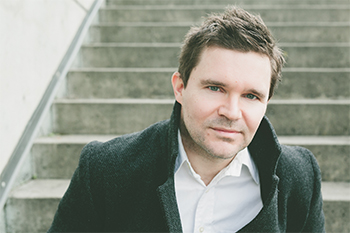Trust to the Dark: PJ Grace
in Conversation with Steven Price

Malahat publicity manager PJ Grace talks influence, fearlessness, and the dark places of writing with acclaimed poet and novelist Steven Price, judge for the 2017 Far Horizons Award for Short Fiction.
The late American poet John Berryman said, "We must travel in the direction of our fear." As a professor of fiction and poetry, what has your experience been with emerging writers sticking to "safe" topics in their writing versus tackling the unknown, the strange, the luminous?
Hm. What would a "safe" topic be? I think everything depends on the writer, which is to say, on how a thing is written. All excellent fiction leads into the unknown, the strange, the luminous - even if it appears to be about the most mundane, the most familiar aspects of a life. A story about a toothache could terrify. A story about a serial killer could bore a reader stiff. I do think emerging writers are often fearless. I suspect Berryman was acknowledging the uneasiness we feel when writing our way into a place we can't see the end of, when we realize what was solid has started to give way, and we can only trust to the dark.
Your dark writing style is often heavily grounded in realism. I'm thinking specifically of Into That Darkness, your first novel, whose poetic, almost detached syntax heightens the reader's anxiety and fear in a post-earthquake environment. I'm curious to know what books you read, if their tone is similar to your own writing, or if you temper the dark and fearful with lighter reading material?
I've always tried to read widely, in fiction, in poetry, but most of all in nonfiction. I do think everything acts as an influence on a writer, and that that's a good thing. I believe an emerging writer ought to read everything she can find, everything she can get her hands on. Influence is a gradual thing, an approximate thing. A young writer afraid of being "influenced" by another writer's voice needs to be reading far more hungrily. We are all of us made up of so many influences, the rhythms of our parents' voices, our childhood friends' teasing, the prose we have read and loved, the songs we heard as infants. Influence is less a mimicry than a kind of echo - what comes back to us is distorted, changed from the original sound. We are all of us accumulated distortions.
Many prose writers would argue the balance between fiction and creative nonfiction is slim at best. How would you encourage writers to integrate real-world experience into their fiction, while still remaining true to the genre?
I think that's far more challenging for the creative nonfiction writer, who must grapple with the ethics of "the real." For the fiction writer, anything goes. I like that there are so many different ways of approaching stories. Some writers feed off their lived experience; others feel freed by translating what they know into something very different. But there is a substance of the real in everything we write, or at least in everything we write that matters to us.
You've published two collections of poetry and two novels, all of which have either won or been nominated for prestigious literary awards, including the 2016 Giller Prize longlist for By Gaslight. Now you're in the judge's seat for the Malahat's 2017 Far Horizons Award. What kinds of stories are you excited to read for this contest? How will you choose what makes a winning story?
I'm looking for stories that come alive, that seem to have surprised and delighted the writer, that find the right expression for the kind of story that they are. Stories that are true to themselves. Stories that are moving, or powerful, or dazzling, or quietly elegant. In other words, stories that startle me by their excellence. Whatever form that takes.
All four of your published works came out within a ten-year period. As a husband and father of two children, how do you balance the working, writing, and family lifestyle? Do you have plans to publish a collection of short stories in the future?
Time is the real currency for the writer, isn't it. You just do your best because what else can you do? In a household of young children (five and two), everything is always changing, year to year. So the solutions are always changing too, and sometimes it seems you can never find an easy arrangement. But you get by, somehow.
A collection of stories? Stories are such an elegant and difficult art. When I have enough fine stories to make up a collection, I'm sure I'll do so. But by god they're hard to do well, aren't they?

PJ Grace
* * * * * * * *









